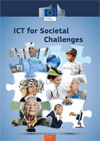
The European Commission is creating the right conditions for smart, sustainable and inclusive growth, through the Digital Agenda for Europe (DAE) and the EU's new Research and Innovation programme, Horizon 2020. Information and Communication Technologies (ICTs) enable us to see the connections between seemingly disparate issues, like transport and energy or health and economic growth, and help us find comprehensive solutions, for example in the European Innovation Partnerships on Smart Cities and Communities and on Active and Healthy ageing. ICTs enhance our quality of life, push productivity and lead to new opportunities for EU citizens and businesses. ICTs frees up data, information, and creativity. They are the lifeblood of 21st century Europe, provided that, in an increasingly interconnected and digital world, we ensure that they can link and work with each other.
Download: ICT for Societal Challenges (.pdf, 1.580 KB).
Download from eHealthNews.eu Portal's mirror: ICT for Societal Challenges (.pdf, 1.580 KB).